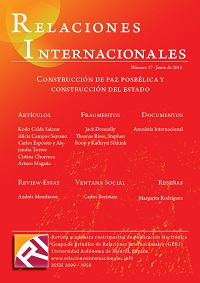Pressures and decision-making in foreign policy: two moments of Mexican policies towards the Arab Israeli conflict
Keywords:
Middle East, Mexico, foreign policy decision-making, pressure groups, transnational actors, UNCopyright (c) 2011 Arturo MAGAÑA DUPLANCHER

This work is licensed under a Creative Commons Attribution-NonCommercial-NoDerivatives 4.0 International License.
Abstract
To portray Mexican policy towards the Arab Israeli conflict as ambiguous, ambivalent, undefined or distant is definitely a mistake. In two moments particularly significant of the conflict, it is rather self-evident that the independent or concerted action of pressure groups and transnational actors with clear sympathies for one or the other of the two competing groups, exerted pressure over the Mexican Government and tried to influence its policies on the matter. In this article, we discuss in a historical perspective, taking Mexico and its policies towards the Middle East as a case study, the influence of domestic and international non-state actors in the foreign policy formulation and decision-making process.





